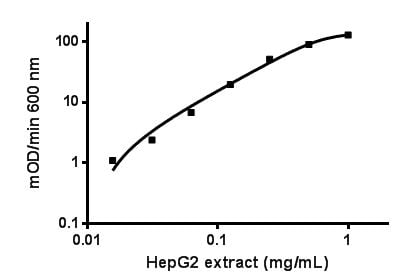Phospho S232 PDH E1 alpha protein (PDHA1) Profiling ELISA Kit (ab115343)
Key features and details
- Sensitivity: 31 µg/ml
- Range: 31 µg/ml - 1000 µg/ml
- Sample type: Cell culture extracts, Tissue Extracts
- Detection method: Colorimetric
- Assay type: Sandwich (quantitative)
- Reacts with: Mouse, Rat, Cow, Human
Overview
-
Product name
Phospho S232 PDH E1 alpha protein (PDHA1) Profiling ELISA Kit
See all PDHA1 kits -
Detection method
Colorimetric -
Precision
Intra-assay Sample n Mean SD CV% 1 8 = 8.3% Inter-assay Sample n Mean SD CV% 1 4 = 7.7% -
Sample type
Cell culture extracts, Tissue Extracts -
Assay type
Sandwich (quantitative) -
Sensitivity
= 31 µg/ml -
Range
31 µg/ml - 1000 µg/ml -
Assay duration
Multiple steps standard assay -
Species reactivity
Reacts with: Mouse, Rat, Cow, Human -
Product overview
ab115343 is an in vitro enzyme-linked immunosorbent assay to determine the levels of phospho S232 PDHA1 protein in cell and tissue lysates. The assay employs a mouse antibody specific for PDHA1 protein coated on a 96-well plate. Samples are pipetted into the wells and PDHA1 protein present in the sample is bound to the wells by the immobilized antibody. The wells are washed and a rabbit anti-phospho S232 PDHA1 protein detector antibody is added. After washing away unbound detector antibody, HRP-conjugated anti-rabbit antibody is pipetted into the wells. The wells are again washed, an HRP substrate solution (TMB) is added to the wells and color develops in proportion to the amount of phospho S232 PDHA1 protein bound. The developing blue color is measured at 600 nm. Optionally the reaction can be stopped by adding hydrochloric acid which changes the color from blue to yellow and the intensity can be measured at 450 nm.
-
Notes
Store all components at 4°C. The kits are stable for at least 6
months. Unused microplate strips should be returned to the pouch
containing the desiccant and resealed.
-
Platform
Microplate
Properties
-
Storage instructions
Store at +4°C. Please refer to protocols. -
Components 1 x 96 tests 10X Blocking Buffer 1 x 6ml 10X HRP Label 1 x 1ml 10X phospho S232 PDHA1 protein Detector Antibody 1 x 0.7ml 20X Buffer 1 x 20ml Extraction Buffer (ab260490) 1 x 15ml Microplate 96 antibody coated wells in 12 strips 1 unit HRP Development Solution 1 x 12ml -
Research areas
-
Function
The pyruvate dehydrogenase complex catalyzes the overall conversion of pyruvate to acetyl-CoA and CO(2). It contains multiple copies of three enzymatic components: pyruvate dehydrogenase (E1), dihydrolipoamide acetyltransferase (E2) and lipoamide dehydrogenase (E3). -
Tissue specificity
Ubiquitous. -
Involvement in disease
Defects in PDHA1 are a cause of pyruvate decarboxylase E1 component deficiency (PDHE1 deficiency) [MIM:312170]. PDHE1 deficiency is the most common enzyme defect in patients with primary lactic acidosis. It is associated with variable clinical phenotypes ranging from neonatal death to prolonged survival complicated by developmental delay, seizures, ataxia, apnea, and in some cases to an X-linked form of Leigh syndrome (X-LS).
Defects in PDHA1 are the cause of X-linked Leigh syndrome (X-LS) [MIM:308930]. X-LS is an early-onset progressive neurodegenerative disorder with a characteristic neuropathology consisting of focal, bilateral lesions in one or more areas of the central nervous system, including the brainstem, thalamus, basal ganglia, cerebellum, and spinal cord. The lesions are areas of demyelination, gliosis, necrosis, spongiosis, or capillary proliferation. Clinical symptoms depend on which areas of the central nervous system are involved. The most common underlying cause is a defect in oxidative phosphorylation. LS may be a feature of a deficiency of any of the mitochondrial respiratory chain complexes. -
Cellular localization
Mitochondrion matrix. - Information by UniProt
-
Alternative names
- ODPA_HUMAN
- PDH
- PDHA
see all -
Database links
- Entrez Gene: 407109 Cow
- Entrez Gene: 5160 Human
- Entrez Gene: 18597 Mouse
- Entrez Gene: 29554 Rat
- Omim: 300502 Human
- SwissProt: A7MB35 Cow
- SwissProt: P08559 Human
- SwissProt: P35486 Mouse
see all
Images
-
The PDHA1 bound from undosed HeLa cells was subject to in-well kinase treatment (PDK1&3) or in-well phosphatase treatment (PDP1) according to the supplementary protocol shown below. Untreated cells showed a significant endogenous phosphorylation signal at S232 which is only slightly increased by kinase treatment. Conversely phosphatase treatment was able to significantly reduce the phospho S232 signal from the endogenous levels.
-
HeLa cells were cultured for 4 hours in media supplemented with DCA (20mM) to specifically inhibit mitochondrial PDH kinases, or NaF (20mM), a general inhibitor of serine/threonine protein phosphatases. The DCA treatment reduced the level of phospho S232. Conversely NaF treatment, to inhibit cellular serine phosphatases, increased the phosphorylation level of S232.
-
Example control sample curve for HepG2 cell extract. The phosphorylation state of PDHA1 can vary by treatment but also by cell culture conditions such as media supplements, nutrients and also cell density.
-
Example control sample curve for HeLa cell extract. The phosphorylation state of PDHA1 can vary by treatment but also by cell culture conditions such as media supplements, nutrients and also cell density.
















